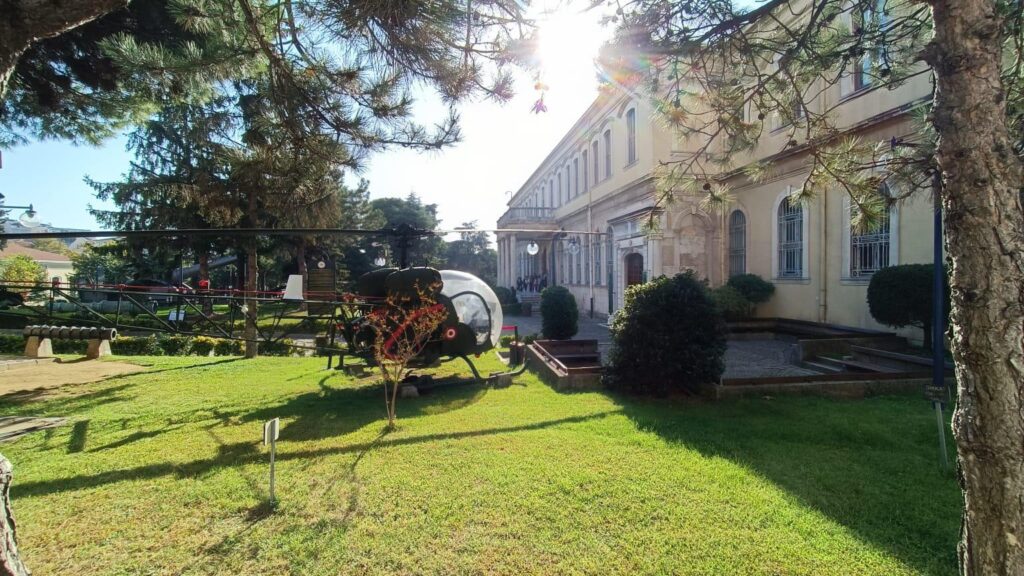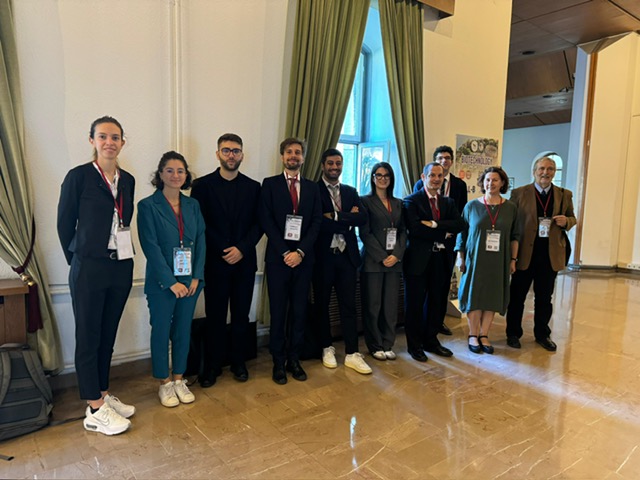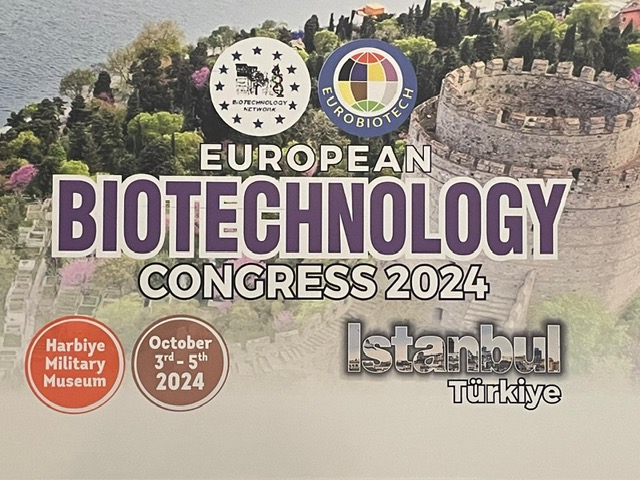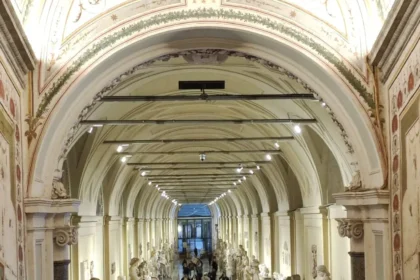The Role of EBTNA and the Congress
The European Biotechnology Thematic Network Association (EBTNA), founded in 1996, has established itself over the years as one of the leading international organizations promoting cooperation between academia and industry in the field of biotechnology. EBTNA‘s merit lies in creating a global collaborative network, bringing together researchers and companies to address some of the most complex challenges in the biotechnology sector, with a multidisciplinary approach covering a wide range of topics from agricultural to medical biotechnology, as well as industrial and environmental applications.
The European Biotechnology Congress, now in its 2024 edition, took place from October 3 to 5, 2024, in the splendid city of Istanbul, Turkey. This event, hosted in various locations over the years, represents a landmark for industry professionals, offering a vital platform for sharing knowledge, presenting innovative research, and fostering synergies between researchers from around the world. With the participation of leading experts from over 30 countries, the congress reaffirmed its global relevance, with sessions exploring the latest biotechnological discoveries and their practical applications.

The Context
Istanbul, a City Between East and West, chosen as the venue for the congress, provided a unique and fascinating setting. This cosmopolitan metropolis, with its millennial history and strategic location between Europe and Asia, has always been a symbol of the meeting of diverse cultures. The Harbiye Military Museum, where the congress was held, is an impressive complex that preserves Turkey’s military history but also serves as a cultural center for events of international importance. With its exhibitions of historical artifacts and views of the Bosphorus, the museum provided an ideal backdrop for an event aimed at merging tradition and innovation.
Walking through the museum’s halls, participants were able to admire military history pieces dating back to the 13th century, while also attending conferences in an environment that reflected both the city’s rich cultural heritage and its dynamic modernity. The choice of Istanbul further strengthened the spirit of the congress: a place where East meets West, just as biotechnology connects different disciplines to solve the challenges of the future.

The EBTNA Board and the Leadership of Munis Dundar
The 2024 European Biotechnology Congress was chaired by Prof. Munis Dundar, President of EBTNA, a leading figure in European biotechnology. Under his leadership, the congress has become a must-attend event for scientists in the field, creating a hub for the exchange of innovative ideas and the establishment of new collaborations. Alongside him, an international board of experts, including Tommaso Beccari and Matteo Bertelli, contributed to organizing a program of high scientific value with their own researchers.
The variety of topics covered during the congress, from biocatalysis to medical biotechnology, reflects EBTNA‘s vision, which aims to encompass all aspects of modern biotechnology. Under Prof. Dundar’s guidance, the association has consolidated itself as one of the main promoters of biotechnology in Europe, fostering the development of new technologies and facilitating the connection between academia and industry.
The MAGI Group Session
The MAGI Group, known for its pioneering research in the field of rare genetic diseases, had the honor of organizing a session on October 4, from 3:00 PM to 4:30 PM, which garnered significant interest from participants. The session, titled Mathematical Models and Omics in Personalized Medicine, was moderated by two prominent figures: Tommaso Beccari and Matteo Bertelli. The two moderators skillfully guided the discussions, stimulating dialogue among various researchers and promoting innovation in the field of omics sciences and mathematical models applied to biotechnology.

The session featured presentations from speakers showcasing highly innovative studies:
- Jurgen Kaftalli presented a mathematical model to identify clinical correlations in retinal dystrophies using proteomic data. His work highlighted new potential biomarkers for diagnosing and treating these diseases.
- Kevin Donato explored the concept of Polygenic Risk Score to study the biological basis of genetic diseases, demonstrating how these methodologies can be used for predicting and preventing multifactorial diseases.
- Kristjana Dhuli presented a mathematical model for cancer screening based on spectrometric analysis of serum peptides, an innovation that could revolutionize early cancer diagnosis.
- Maria Chiara Medori proposed a new mathematical model for studying retinal dystrophies in patients who test negative for Mendelian genetic tests. Her innovative approach provided new tools for analyzing rare and complex ocular diseases.
- Alessandro Macchia introduced an advanced mathematical approach to integrating omics and clinical data to enhance understanding of complex genetic diseases. His work emphasized the importance of combining different types of biological data to achieve a more comprehensive view of pathological mechanisms.
- Cecilia Micheletti presented an innovative cardiovascular risk prediction model that combines omics and clinical data, demonstrating how these integrations can improve prevention and management of cardiovascular diseases.
- Gabriele Bonetti concluded the session with a study on the molecular basis of lipedema, using both a Support Vector Machine model and a neural network-based model. The use of both methods allowed for distinguishing lipedema from other subcutaneous adipose tissue disorders, combining the precision of SVM in classifying complex data with the ability of neural networks to capture non-linear relationships, thus providing a more suitable model for non-linear data.
The MAGI Group session was widely appreciated for its ability to integrate different disciplines and propose innovative solutions to address complex diseases. Thanks to Beccari and Bertelli’s moderation, the session provided a rich and dynamic platform for discussion, stimulating new ideas and future collaborations among the researchers present.
International Meetings and Collaborations
In addition to the scientific presentations, the congress was also an important networking opportunity. One of the most significant meetings was between the MAGI Group and the team from the University of Wolverhampton, led by Prof. Izabela Radecka, along with her collaborators Abhishek Gupta and Fideline Tchuenbou-Magaia. During the meeting, a collaboration agreement between the two institutions was discussed and formalized, strengthened by their shared membership in the European Biotechnology Thematic Network Association (EBTNA). This agreement promises to create a solid foundation for the development of joint projects in biotechnology, with a particular focus on research into genetic diseases and new diagnostic and therapeutic techniques.
The cooperation between the MAGI Group and the University of Wolverhampton is part of a broader strategy of research internationalization, facilitated by EBTNA, which acts as a link between various European scientific and industrial realities. The agreement represents a significant step forward towards increasingly integrated and multidisciplinary research capable of collaboratively addressing the challenges of the future.
Bosphorus Cruise
One of the most memorable moments of the congress was the dinner cruise on the Bosphorus, an experience that allowed participants to enjoy the beauty of Istanbul from a unique perspective. Aboard a luxurious mega yacht, participants enjoyed a delicious three-course dinner. Among the landmarks admired during the cruise were the Dolmabahçe Palace, the Galata Tower, and the majestic Bosphorus Bridge, which connects Europe and Asia.

The cruise represented not only a moment of relaxation but also a networking opportunity in an informal setting. Between courses, participants had the chance to exchange ideas, discuss potential collaborations, and strengthen existing contacts, all while admiring the breathtaking panorama of Istanbul illuminated by the evening lights.
Final Acknowledgements
In conclusion, the 2024 European Biotechnology Congress was a success both scientifically and organizationally. We would like to thank Prof. Munis Dundar, President of EBTNA and organizer of the congress, for his vision and leadership, which made this significant event possible. A heartfelt thanks also goes to Professor Tommaso Beccari, Dr. Matteo Bertelli, Prof. Izabela Radecka, and their collaborators. This partnership, facilitated by their shared membership in EBTNA, represents an important step forward towards integrating biotechnological research at an international level. The congress left a profound mark on the scientific community, paving the way for new projects and collaborations that promise to revolutionize the European and global biotechnology landscape in the coming years.




